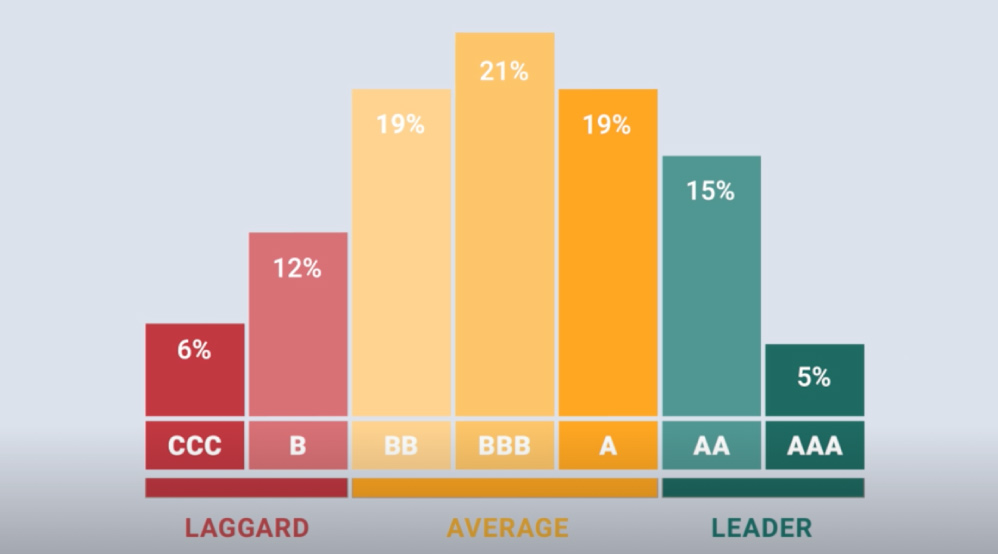ESG risk scores are the ultimate barometer for a company’s environmental, social, and governance performance.
These scores give investors a clear view of a company’s sustainability and ethical practices, allowing them to make informed investment decisions.
High ESG scores indicate that a company is well-managed, socially responsible, and poised for long-term growth.
In today’s rapidly evolving business landscape, ESG risk scores are a must-have tool for investors and companies looking to stay ahead of the curve!
Table of Contents
ESG Risk Score Meaning
ESG scores, or Environmental, Social, and Governance scores measure a company’s performance in areas that impact the environment, society, and governance.
The scores evaluate a company’s practices in these areas and provide a comprehensive view of its sustainability and ethical performance.
ESG scores are calculated using various data sources, including publicly disclosed information, news articles, and third-party research reports, and are used to rank a company relative to its peers.
Investors are becoming increasingly interested in ESG scores because they believe that companies with strong ESG practices are more likely to be financially successful over the long term.
For companies, ESG scores provide an opportunity to demonstrate their commitment to sustainability and ethical practices and can help attract investment, reduce regulatory and reputational risks, and improve overall performance.

Calculation of ESG Scores
ESG scores are calculated based on analyzing various data sources, including publicly disclosed information, news articles, and third-party research reports.
The data is analyzed to determine a company’s exposure to ESG risks, such as climate change, labor practices, and corporate governance, and its overall performance in these areas.
The scores are then used to rank a company relative to its peers, providing investors with valuable insights into the company’s ESG performance.

Data Sources
- ESG scores are calculated based on a thorough analysis of various data sources, including publicly disclosed information, news articles, and third-party research reports.
- These sources provide a wealth of information on a company’s ESG practices and performance, allowing for a comprehensive evaluation of its ESG risk exposure.
Analysis of Data
- The data is analyzed to determine a company’s exposure to ESG risks, such as climate change, labor practices, and corporate governance.
- This analysis considers factors such as a company’s carbon emissions, labor practices, and governance structures, among others.
- The goal of the analysis is to provide a comprehensive view of a company’s ESG performance and identify areas for improvement.
Ranking Companies
- The scores are then used to rank a company relative to its peers, providing investors with valuable insights into the company’s ESG performance compared to its competitors.
- The ranking allows investors to quickly compare a company’s ESG performance to that of other companies in its industry and make informed investment decisions.
Why are ESG Scores Important for Investors?
Investors are becoming increasingly interested in ESG scores because they believe that companies with strong ESG practices are more likely to be financially successful over the long term.
Companies with high ESG scores are often seen as better managed, more socially responsible, and more likely to generate sustainable long-term growth.
This makes them more attractive to investors who are seeking to invest in companies that are poised for long-term success.
Financial Success and Investment Decisions
Investors’ Interest in ESG Scores
- Investors are becoming increasingly interested in ESG scores because they believe that companies with strong ESG practices are more likely to be financially successful over the long term.
- This is due to the growing recognition of the importance of ESG considerations in driving long-term business success.
Companies with High ESG Scores
- Companies with high ESG scores are often seen as better managed, more socially responsible, and more likely to generate sustainable long-term growth.
- This is due to their focus on sustainable and ethical practices, which can help them reduce risks, improve performance, and attract investment.
Attractive to Investors
- These factors make companies with high ESG scores more attractive to investors who are seeking to invest in companies that are poised for long-term success.
- By investing in companies with strong ESG practices, investors are able to align their investments with their values and support companies that are working to create a better future.
Importance of ESG Score for Companies
ESG scores play a critical role in helping companies understand and improve their Environmental, Social, and Governance (ESG) performance.
By providing a comprehensive view of a company’s ESG practices and risks, ESG scores help companies identify areas for improvement and develop strategies to reduce their ESG risks.
By improving their ESG performance, companies can reduce their exposure to regulatory and reputational risks, attract investment from socially responsible investors, and improve their overall performance.
The importance of ESG scores for companies is evident, as they provide a valuable tool for companies looking to stay ahead of the curve in today’s rapidly evolving business landscape.
Demonstrating Commitment
- ESG scores provide companies with an opportunity to demonstrate their commitment to sustainability and ethical practices.
- By participating in ESG score evaluations, companies can showcase their efforts to reduce their exposure to ESG risks and improve their overall ESG performance.
- This demonstration of commitment can help companies build trust with stakeholders and attract investment from socially responsible investors.
Identifying Areas for Improvement
- Companies can also use ESG scores to identify areas for improvement in their ESG practices.
- The scores provide a comprehensive view of a company’s ESG performance and can highlight areas where the company can improve its ESG practices and reduce its ESG risks.
- By using the scores to identify areas for improvement, companies can develop strategies to reduce their ESG risks and improve their overall ESG performance.
Reducing Risks and Improving Performance
- By reducing their exposure to ESG risks, companies can reduce their exposure to regulatory and reputational risks.
- For example, by reducing their carbon emissions, companies can reduce their exposure to regulatory risks associated with climate change.
- Additionally, by improving their ESG practices, companies can improve their reputation, which can help them attract investment, reduce costs, and improve their overall performance.
Conclusion
ESG scores are becoming an increasingly important tool for both investors and companies in today’s rapidly evolving business landscape.
They provide a comprehensive view of a company’s Environmental, Social, and Governance (ESG) performance and help companies identify areas for improvement and reduce their ESG risks.
For investors, ESG scores provide valuable insights into a company’s ESG performance and help them make informed investment decisions, aligning their investments with their values and supporting companies that are working to create a better future.
For companies, ESG scores provide an opportunity to demonstrate their commitment to sustainability and ethical practices, identify areas for improvement, and reduce their exposure to ESG risks.
As the importance of ESG considerations continues to grow, ESG scores will play an increasingly critical role in helping investors and companies stay ahead of the curve.
By using ESG scores to evaluate and improve their ESG performance, both investors and companies can contribute to the creation of a more sustainable and equitable future.
References:
- Maximizing Innovation in Turbulent Times: 8 Proven Methodologies for …. https://www.linkedin.com/pulse/maximizing-innovation-turbulent-times-8-proven-methodologies
- Environmental, Social, and Governance (ESG) Factors and Corporate Financial Performance: A Systematic Review and Meta-Analysis” by M. Ismail, J. S. Li, and Y. T. Chia (2020) – This study conducted a systematic review and meta-analysis of existing literature on the relationship between ESG factors and financial performance. The authors found that ESG factors are positively associated with financial performance, although the relationship between ESG and financial performance is not always significant or linear.
- The Relationship between Environmental, Social, and Governance (ESG) Ratings and Financial Performance: Evidence from Europe” by Maria-Paz Patiño-Martínez, Eva García-Castro, and Ramón Rodríguez-Domínguez (2019) – This study investigated the relationship between ESG ratings and financial performance in Europe. The authors found that companies with higher ESG ratings tend to have better financial performance, although the relationship between ESG and financial performance is not always significant or linear.

